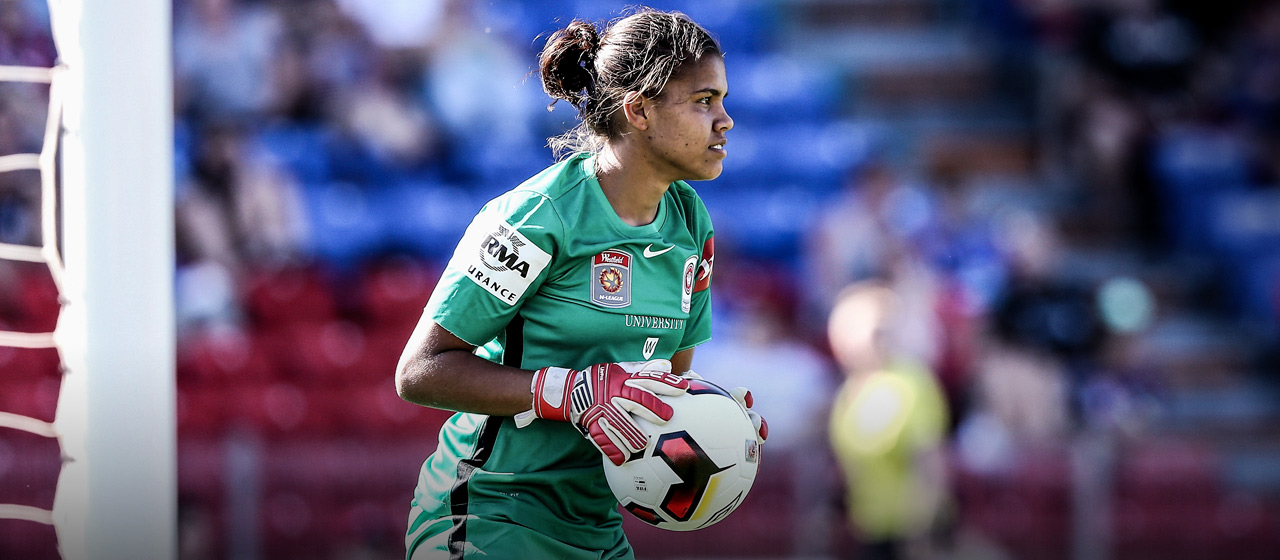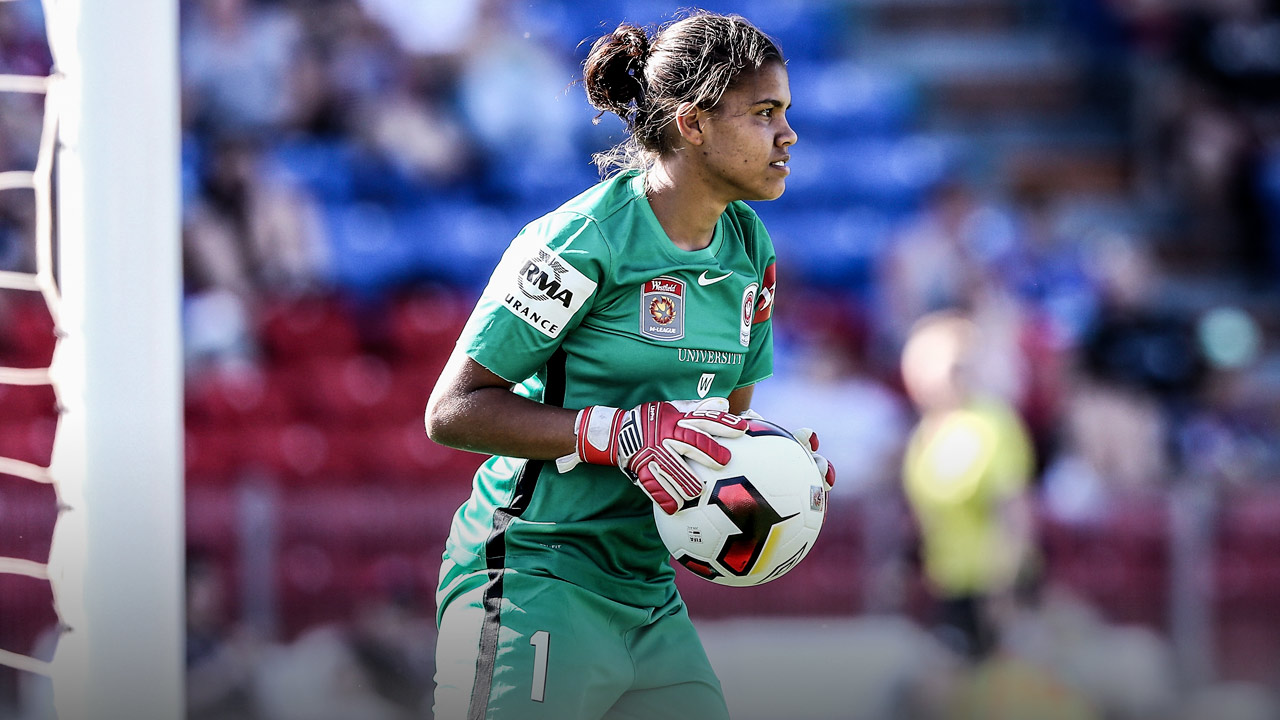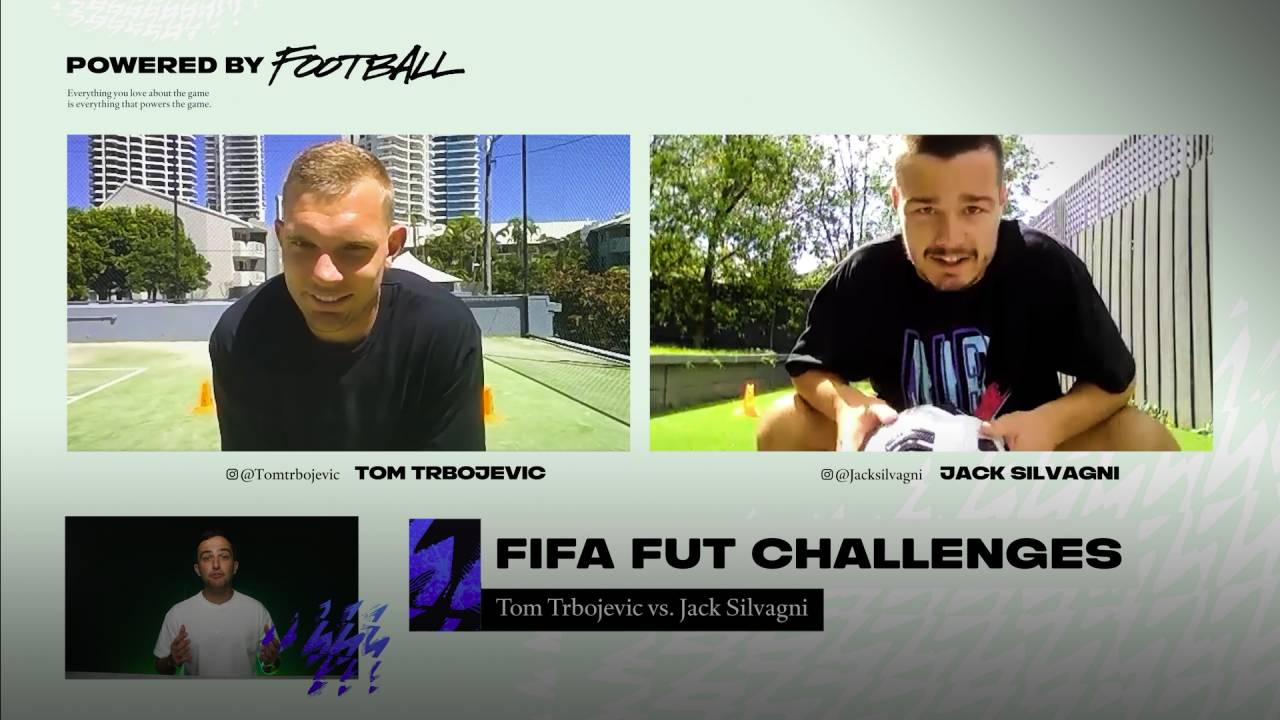Football
Our home was a tent
I’m a proud Indigenous woman of the Wiradjuri and Yorta Yorta people and I don’t think it’s possible to fully understand my story without knowing a little bit about where I come from.
My mum’s side of the family are Wiradjuri, and they come from Wagga. My nan and pop, Dorothy and Hewitt, have helped provide Indigenous people with free access to doctors, dentists and other health care professionals. They’ve also done some amazing work with the Aboriginal Legal Service and helped young people across the community understand there is a traditional culture they are a part of.
That’s really important to them. Pop’s family were part of the stolen generation. Pop is the eldest of 14 siblings and most of them were taken away when he was very young. That had a big impact on his life. They’ve only all reconnected recently.
The other side of the family, the Yorta Yorta side, are quite creative. The Sapphires are actually my aunties!
I’ve had all these inspirational people in my life from a young age. They’ve shaped who I am and made me determined to be a strong leader.

THE SCARY MATILDAS
When I was about 10, one of my friends from school wanted me to have a run for the West Wagga Football Club.
My whole family are AFL-mad and when I spoke to mum about it, she was umming and aahing. She didn’t know what to think of this whole ‘football thing’.
It was my pop who said I should give it a go. He thought it would be good for me to try something new. That’s how it all began. I became the first person in my whole family to ever play football.
I fell in love with the sport immediately.
I started out on mixed teams and the boys could be very rough. I tried to be just as rough back to them. It was a hard way to come up in the sport.
And if I’m honest, sometimes those sporting battles went too far. Some of the boys said racist things towards me and my mum, who was always watching on the sidelines. They’d call me a ‘black bitch’ and have a go at me for being a girl.
Hearing that sort of stuff made my mum so mad. She’d react and then they’d be having a go at her as well. It got pretty heated a couple of times.
I just got on with playing the game. Those boys couldn’t handle the fact that a girl was giving them a run for their money.
Some of the boys said racist things towards me and my mum, who was always watching on the sidelines. They’d call me a ‘black bitch’ and have a go at me for being a girl.
West Wagga were always very supportive, though, and by that stage I was well and truly hooked. It was around that time that I remember watching a TV interview with the Matildas goalkeeper, Lydia Williams. She spoke about her background growing up in Kalgoorlie as the daughter of an Aboriginal elder.
It was inspiring to see an Indigenous woman representing Australia at the highest level. From that moment on, I wanted to follow in her footsteps.
After my second year playing for the NSW Country team, my coach asked if I could fill in for his NPL club in Sydney, the Macarthur Rams. He needed a goalkeeper for the under-16s team. I thought that was unreal.
I ended up getting thrown in the deep end after just a few weeks. The first and reserve grade goalkeepers both got injured and all of a sudden, I found myself in a Sydney first grade squad at just 13 years of age.
I had no idea what I was getting myself into.
I remember walking into the changeroom before my first game and it was filled with Matildas. Emily van Egmond was there, as well as Kylie Ledbrook, Renee Rollason and Leena Khamis.
I remember being so excited about that opportunity, even though it was intimidating stepping into a team of that quality. Those girls didn’t take it easy on me either, which was good. I remember getting smashed by a couple of them after making a couple of mistakes in one game. They were bloody scary!
But they also encouraged me to keep on working hard. It was awesome getting feedback like that from such top players. They were my heroes.

LIVING IN A TENT
It wasn’t long after that opportunity with the Rams presented itself that I was scouted by Tom Sermanni, who was the coach of the Matildas back then, and also two national goalkeeping coaches, Paul Jones and Tony Franken.
They offered me the chance to move up to Canberra fulltime to train with Paul Jones’ goalkeeping academy. I couldn’t believe it.
Mum and my step-dad, Brad, knew it was the only way I could experience that next level of football, but it would also mean uprooting the whole family and beginning a new life from scratch. Still, they were determined to try something new and give it a shot for me.
So we decided to move in with my aunty and her family, who lived in Canberra, while we found our feet. My aunt had young kids as well, so it was a lot of people under one roof. We moved out after a month or so.
That pretty much left us homeless.
We didn’t know whether we should go back to Wagga or not. But Brad is a very stubborn man. He didn’t want to give up. We ended up driving out to Queanbeyan, outside of Canberra, and found a camping ground. We set up a tent and ended up living there for two months.
The tent was black, with two rooms separated by a middle area, where we left our shoes and food. My mum and Brad slept in one room and the kids were in the other on a double mattress. Between me and my three younger siblings, all under the age of 10, it was pretty cramped.
I think it cost us $200 a week to stay, but there were toilets and 20 cents would get you a shower with hot water. It was better than nothing!
It was the hardest thing I’ve ever had to go through and I hated the fact that my family was in that situation because of me. I really started to doubt myself.
We didn’t want my brothers and sisters worrying, though, so we tried to make out like it was just a fun, chill-out holiday. We were on the river, so we could do a bit of fishing and other fun things like that, to make it seem more like a normal camping trip.
We all started going to school in Queanbeyan and I was still travelling to Canberra for training. Keeping busy took my mind off things at first, but it wasn’t easy.
What made it more difficult was that we couldn’t afford to eat three meals a day. We had to miss lunch and try to make sure we had enough for breakfast and dinner to get us through the day. I felt like I was running on empty a lot of the time.
We tried to make the best of the situation, but as time went on, living in that tent got harder and harder.
Then a storm hit and immediately, we realised we’d made a huge error in setting up the tent. We’d put the cover on inside out, so it wasn’t waterproof like it was supposed to be. The rain was pouring in through the roof.
I remember us all running out in the middle of the night to flip the cover over but the damage was already done. A lot of our belongings were soaked, including the mattresses. Other personal things, like my passport, were ruined as well.
It ended up raining for two weeks.
It was the hardest thing I’ve ever had to go through and I hated the fact that my family was in that situation because of me. I really started to doubt myself.
I called Pop one night in tears and I remember saying to him, ‘I don’t want to be here. I don’t want to do this to my family, for something that I don’t even know will pay off in the end’.
He was the best listener that night. He calmed me down a lot and told me that it would all work out in the end. He said that, for a 14-year-old, I was one of the strongest people he knew. That really made me believe I could get through it.
Brad always inspired me like that as well. He never broke down once, no matter how tough it got. He just kept trying to find work to put his family in a better place.
He was a concreter, working endless hours. And my mum had four young kids to look after at the tent. They weren’t lazy! They’re the two strongest people I know.
I just had to believe things would get better.
Thanks to my nan and pop and the other generous people who sent money, we were able to get back on our feet again.
Mum and Brad had found a rugby league team for my little siblings to play at in Queanbeyan and they made some good friends there with other parents. One of them had found us a house. We couldn’t believe it!
Packing up the tent was the most amazing feeling – and the biggest relief, because it was starting to get cold and we wouldn’t have lasted long out there in the winter. We got our furniture out of storage and tried to make that small little townhouse in Queanbeyan feel like home.
WORLD CUP DREAMS
It didn’t compare to the tent experience, but living in Queanbeyan and playing for Macarthur wasn’t easy.
We knew that if my football was to go to the next level, I had to be in Sydney full-time. Eventually, an opportunity came up for us to move into a small place in Riverstone, in Sydney’s western suburbs. Mum and Brad jumped on it. We packed up the car and moved to the big smoke.
I’m not going to lie: there have been some hard times in Sydney as well. But on the whole, it’s been a great experience. Brad has been able to get plenty of concreting work and all my siblings have finally been able to get a bit more stability, instead of constantly having to change schools.
One of the former Matildas at Macarthur, Leah Blayney, even helped me get into Westfield Sports High. It was the perfect environment for me.
I called Pop one night in tears … ‘I don’t want to be here. I don’t want to do this to my family, for something that I don’t even know will pay off in the end.’
By the time I was 15, I’d cemented my spot in the Rams’ first-grade team and that led to an even better opportunity for me. We were coached by Norm Boardman, who also managed Western Sydney in the W-League.
Norm brought me across to the Wanderers that same season. It’s meant playing at the highest club level in Australia and learning off a top goalkeeping coach in Davide Del Giovine.
We didn’t get on very well at the start, because I was so set in my ways. But he persevered and after a few years, I feel established as a W-League keeper.
In my third season at the Wanderers, I was named the members’ player and players’ player of the year. Those two awards were for Davide, for all the faith that he has shown in me. I wouldn’t be the player I am without him and I know that our men’s goalkeeper, Vedran Janjetovic, feels the same way.
I’ve still got a long way to go. I’m determined to keep getting better, because it’s a big year coming up with the Women’s World Cup on in France in 2019. That’s my goal.
The Matildas have three great goalkeepers at the moment in Lydia, Mackenzie Arnold and Eliza Campbell. All I can do is focus on my own game and make sure that if an opportunity does come along, I’m ready.

MY INSPIRATION
My family’s history has inspired me to be a leader. That’s why I’m so passionate about working in the community, especially with the John Moriarty Foundation.
John Moriarty was the first Indigenous Socceroo and the JMF empowers many Aboriginal kids in remote communities through football. It’s important because this is an expensive sport in Australia and there are a lot of barriers for Indigenous people to overcome if they want a career in professional football.
I certainly wouldn’t be where I am if it wasn’t for the JMF. They’ve assisted financially when I haven’t been able to pay for crucial things and helped me with my education.
I’m a mentor to the JMF kids in Sydney. My job is to help them with the huge change in their lives. I know how tough it can be because I’ve been in their shoes.
It was a huge honour being named the Rebel Role Model earlier this year. I received the award from the FFA at the launch of Female Football Week.
It meant so much to my family.
After what they’ve been through for me, I just want to make them proud.
More about: FIFA Women's World Cup | Indigenous Australians | Matildas | Resilience | W-League | Western Sydney Wanderers | Women's Sport







 Load More
Load More